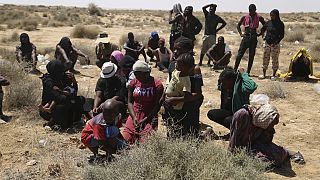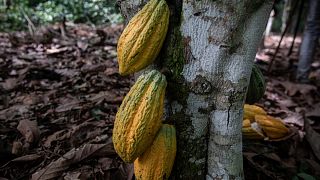Ivory Coast
The Banco Park in Ivory Coast is the second largest natural reserve in the world located in the center of the capital Abidjan.
The shield of greenery acts as a defense against erosion. In the heart of the forest is the Banco River, which has been transformed into a giant open-air laundry.
These makeshift washers commonly called "Fanicos" are mostly from neighboring countries.
From 6am local time, the ‘’Fanicos’’ walk from door to door collecting laundry in houses of the surrounding neighborhoods of Yopougon, Attécoubé and Abobo.
It’s the only way Ben has been making a living.
''I got married because I earned money from this job. There are a lot of people who earn money and open shops. When you save 200,000 FCFA ($370) or 300,000 ($545), you go to Mali to show your parents'', Ben Ladji, a washerman told our Correspondent, Mmah Camara.
Detergents and homemade soap are essential but uncontrolled products used by the fanicos. But the products risk their health.
The washers as well as their clients are exposed to health problems such as typhoid fever, hepatitis and cholera.
Another visible impact is on the environment, with the Ebrié lagoon having already lost more than 1/10th of its surface area over the past three decades.
Professor Ossey Bernard Yapo is the Deputy Director of the Ivorian Anti-Pollution Center(CIAPOL). He said the activity is having a negative impact on the environment.
‘’All these residues of products are poured into the lagoon and damages the environment. So the activity of the ‘’Fanicos’’ also have a negative impact on the quality of the water in the Ebrié lagoon, in terms of the chemical elements that are cleaned and that will accumulate directly in the lagoon environment'', Professor Yapo said.
''Water pollution in Ivory Coast, and particularly in the Ebrie lagoon is increasing. The most badly affected is that of sewage and domestic waste which represents about 37,000 tons per year.
According to the Ivorian anti-pollution center, measures are being taken by the government to curtail the degradation of the Ebrie lagoon, Camara reports.












04:52
Acid spill devastates Zambia’s Kafue River
Go to video
Legal proceedings against Shell for oil pollution impacting Nigeria
01:00
Bright red river outside Buenos Aires sparks fears of pollution
03:04
Kenyan social enterprise aims to reduce environmental impact of textile waste
01:52
Biogas production units slash living costs for farmers in Egypt
01:44
Plastic pollution: Nations meet in final round of talks to strike treaty